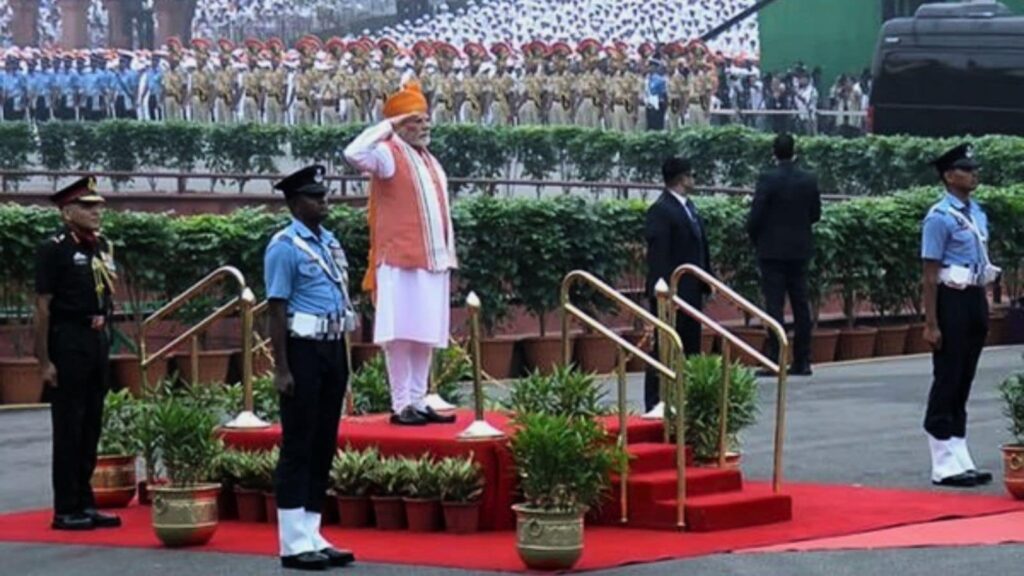970x125
Prime Minister Narendra Modi on Friday reiterated that India will not compromise on the well-being of its farmers, fisher folk, and cattle keepers amid a standoff in trade negotiations with the US over access for American products in India’s agriculture and dairy market. The standoff is being seen as one the reasons behind US President Donald Trump’s announcements of tariffs totalling 50 per cent on Indian goods, the highest tariff rate imposed by Washington on any country.
970x125
“The well-being of Indian farmers, fisher folk, and cattle keepers is our foremost priority. Modi is standing like a wall against any adverse policy that could impact Indian farmers, fisherfolk and cattle keepers. India will never compromise the interests of Indian farmers, fisherfolk and cattle keepers,” the Prime Minister said during his Independence Day speech. The Prime Minister did not make a direct reference to tariffs announced by Trump.
This is the second public speech within a week in which the Prime Minister has expressed his commitment to prevent any adverse impact on Indian farmers. On August 7, after the US President Donald Trump announced additional 25 per cent tariffs on Indian goods—over and above the 25 per cent announced earlier—Modi had said that he would not compromise “even if it entailed paying a very heavy personal price”.
“Indian farmers have made significant contributions to the economy. Their hard work has borne fruit. Last year, farmers broke all records in terms of grain production. Today, India is number one in milk, pulses and jute production. India is the second-largest fish producer, and also the second-largest producer of rice, wheat, fruits and vegetables. These products are reaching foreign markets, and agro-product exports worth Rs 4 lakh crore have been recorded,” the PM said on Friday.
This comes amid demands from the US to open the Indian agricultural market to American genetically modified (GM) products that have traditionally faced resistance in the country from the farming community. India has so far not allowed GM food crops. Farmers have not only resisted foreign agricultural products, they have sought to keep agriculture out of the World Trade Organization (WTO). The Trump administration has also been pushing India to allow greater market access for American dairy products. New Delhi has been opposing these demands from Washington.
Last month, the Indian Coordination Committee of Farmers Movements (ICCFM), a farmers’ body, urged the government to exclude all aspects of agriculture from the US trade deal in order to protect the interests of Indian farmers.
In a letter to Commerce Minister Piyush Goyal, the ICCFM warned that granting duty-free access to US agricultural products under a trade agreement could have serious consequences. It said that the US has been engaged in a trade war with China, Mexico and Canada since 2018, which has severely affected its agricultural exports.
Story continues below this ad
“The US trade deficit in agriculture has nearly doubled, indicating a significant surplus they may seek to offload onto markets like India. For example, soybean exports from the US dropped from $34.4 billion in 2022 to $24.5 billion in 2024, while corn exports fell from $18.6 billion to $13.9 billion during the same period,” the letter stated.
The ICCFM further emphasised the risk to Indian farmers, stating that the US government is among the world’s largest agricultural subsidisers. The 2024 US Farm Bill has allocated a staggering $1.5 trillion towards farm subsidies to American farmers.
These substantial supports not only restrict agricultural imports into the US but also enable American products to enter export markets at artificially low prices. Allowing such heavily subsidised US imports into India, the ICCFM argued, would undermine India’s longstanding position at the World Trade Organization (WTO) against these very subsidies.
A report by the State Bank of India (SBI) also cautioned that opening India’s dairy sector to US imports could result in an annual loss of Rs 1.03 lakh crore to Indian dairy farmers. The report highlighted that milk prices in India could drop by at least 15 per cent if the sector is opened up, significantly affecting the livelihoods of small dairy farmers due to the heavily subsidised US dairy industry.
© The Indian Express Pvt Ltd
970x125


